As the fiscal cliff looms, what's your New Year's message to Washington? Go to CNNiReport to share your video.
Washington (CNN) -- Is it political theater or a true last-ditch effort to avoid the fiscal cliff?
President Barack Obama and congressional leaders met Friday at the White House to discuss the looming combination of tax hikes and spending cuts as increasingly anxious markets and taxpayers looked for any hint of progress.
Diminished hopes for a substantial agreement in Washington again depressed stock indexes on Wall Street despite other encouraging news on the economy. Consumer confidence has also softened due to political inaction.
Economists warn that continued stalemate could trigger recession as taxes go up on everyone with the expiration of lower rates from the administration of President George W. Bush, coupled with slashed government spending, including for the military.
The White House meeting that started shorlty after 3 p.m. ET included Obama, Vice President Joe Biden, House Speaker John Boehner, House Minority Leader Nancy Pelosi, Senate Majority Leader Harry Reid and Senate Minority Leader Mitch McConnell, as well as Treasury Secretary Timothy Geithner.
It came with the Senate back in town after a Christmas holiday for a rare end-of-year appearance before a new Congress convenes early in the new year. Boehner plans to bring the House back on Sunday.
Reid and McConnell took turns blaming the other side for the impasse on Thursday, but neither seized the chance to offer remarks when the Senate opened on Friday. Other senators expressed opinions on the negotiations ranging from optimism to frustration.
"When the dust settles and everything is said and done, federal individual income taxes are not going to go up on almost all Americans next year," GOP Sen. Lamar Alexander of Tennessee told reporters.
Democratic Sen. Chuck Schumer of New York told NBC's "Today" show he was "a little more optimistic today" about reaching a deal.
"Sometimes it's darkest before the dawn," Schumer said, noting the renewed engagement by McConnell and Boehner, the top congressional Republicans.
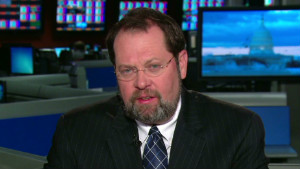 Hopes of fiscal cliff deal dwindling
Hopes of fiscal cliff deal dwindling 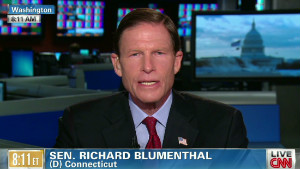 Five days until fiscal cliff
Five days until fiscal cliff 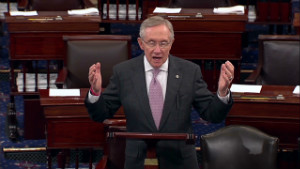 Reid: Boehner running 'dictatorship'
Reid: Boehner running 'dictatorship' 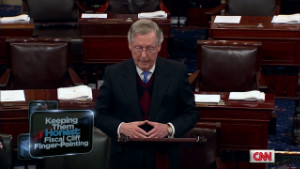 The making of the fiscal cliff problem
The making of the fiscal cliff problem "The fact that (Boehner's) come back and the four of them are at the table means to me we could come up with some kind of agreement that would avoid the main parts of the fiscal cliff, particularly taxes going up on middle-class people," he added.
Sen. Olympia Snowe, R-Maine, told CNN's "Starting Point" that a deal must originate from talks between Obama and the four congressional leaders for Americans to regain confidence in the federal government.
"It's got to start with the leaders and the president at the White House this afternoon. Hopefully they'll agree to a framework," said Snowe, who is retiring.
"I hope the speaker can get this job done before the end of this year and not defer it to next year," she continued. "We've got to demonstrate we have some capacity left to make decisions in Washington on these very significant issues for the country."
However, Republican Sen. Bob Corker of Tennessee downplayed the importance of Friday's meeting on CBS "This Morning," saying it "feels too much to me like optics to make it look like we're doing something."
"This is a total dereliction of duty at every level," added Corker, who has called for Republicans to compromise on the central issue of allowing tax rates to increase on top income brackets. "I've been very surprised that the president has not laid out a very specific plan to deal with this, but candidly Congress could have done the same and I think the American people should be disgusted."
He predicted Friday's meeting would result in a "kick-the-can-down the road" solution, meaning larger questions on tax increases and spending cuts would be put off until next year.
On Thursday, McConnell said his side won't "write a blank check for anything Senate Democrats put forward just because we find ourselves at the edge of the cliff."
Reid, however, argued that Republicans undermined a potentially major agreement over the past two years by refusing to compromise on their opposition to higher tax rates for the wealthy. Hours before Friday's meeting was announced, he was doubtful there would be a deal by January 1.
"I don't know, timewise, how it can happen now," Reid said.
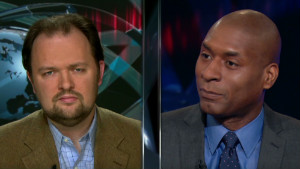 Why both sides want to go over the cliff
Why both sides want to go over the cliff 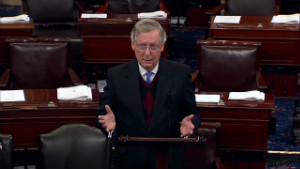 McConnell: We are 'staring at a crisis'
McConnell: We are 'staring at a crisis' 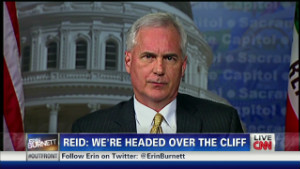 Scaled-back deal key to finding fix?
Scaled-back deal key to finding fix? The principal dispute continues to be over taxes, specifically the demand by Obama and Democrats to extend most of the tax cuts passed under Bush while allowing higher rates of the 1990s to return on top income brackets.
Obama campaigned for re-election on keeping the current lower tax rates on family income up to $250,000, which he argues would protect 98% of Americans and 97% of small businesses from rates that increase on income above that level.
Republicans oppose any kind of increase in tax rates, and Boehner suffered the political indignity last week of offering a compromise -- a $1 million threshold for the higher rates to kick in -- that his GOP colleagues refused to support because it raised taxes and had no chance of passing the Senate.
Last Friday, the president proposed the scaled-back agreement that included his call for extending tax cuts on households with incomes under $250,000, as well as an extension of unemployment insurance.
Both sides say political concerns undermine a possible agreement.
On Thursday, Reid said Boehner wanted to wait until after the new House re-elects him as speaker early next month before proceeding with a compromise -- one that will need support from both Democrats and Republicans to pass.
Boehner is "more concerned about his speakership than putting the country on firm financial footing," Reid claimed.
In response, Boehner spokesman Michael Steel said Reid should stop talking and instead take up legislation passed by the House to avert the fiscal cliff.
Reid and Democrats reject the GOP proposals, which would extend all the Bush tax cuts and revamp the spending cuts of the fiscal cliff, calling them insufficient and saying they would shift too much deficit reduction burden on the middle class.
One possibility is the fiscal cliff takes effect and taxes go up in January, then Congress steps in to bring tax rates back down for at least some people -- allowing them to say they're lowering taxes, even if rates for top income brackets are higher in 2013 than they were in 2012.
Obama and Democrats have leverage, based on the president's re-election last month and Democratic gains in the House and Senate in the new Congress. In addition, polls consistently show majority support for Obama's position on taxes, and Democrats insist the House would pass the president's plan with Democrats joined by some Republicans if Boehner allowed a vote on it.
However, anti-tax crusader Grover Norquist has vowed to back primary challenges against Republicans who violate his widely signed pledge not to raise taxes. Even if a deal is reached, Norquist predicts budget showdowns will continue every time the government needs more money to operate.
"There the Republicans have a lot of clout because they can say we'll let you run the government for the next month, but you've got to make these reforms," he said this week.
On Wednesday, Treasury Secretary Timothy Geithner told Congress the government would reach its borrowing limit at year's end, but could take steps to create what he called "headroom" for two months or so.
However, Geithner said uncertainty about the fiscal cliff and deficit negotiations make it hard to predict precisely how long government measures to address the situation will last.
The possibility of a fiscal cliff was set in motion over the past two years as a way to force action on mounting government debt.
Now, legislators risk looking politically cynical by seeking to weaken the measures enacted to try to force them to confront tough questions regarding deficit reduction, such as changes to government programs like Social Security, Medicare and Medicaid.
The two sides seemingly had made progress early last week on forging a $2 trillion deficit reduction deal that included new revenue sought by Obama and spending cuts and entitlement changes desired by Boehner.
Obama's latest offer set $400,000 as the income threshold for a tax rate increase, up from his original plan of $250,000. It also had a new formula for the consumer price index -- called chained CPI -- that wraps in new assumptions on consumer habits in response to rising prices, such as seeking cheaper alternatives, and would result in smaller benefit increases.
Statistics supplied by opponents say the change would mean Social Security recipients would get $6,000 less in benefits over the first 15 years of chained CPI. Liberal groups have openly challenged the plan, calling it a betrayal of senior citizens who contributed all their lives for their benefits.
Boehner appeared to move on increased tax revenue, including higher rates on top income brackets and eliminating deductions and loopholes. But his inability to rally all House Republicans behind his plan last week raised questions about his role and what comes next.
What happens to the economy if we go over the cliff?
{ 0 comments... read them below or add one }
Post a Comment